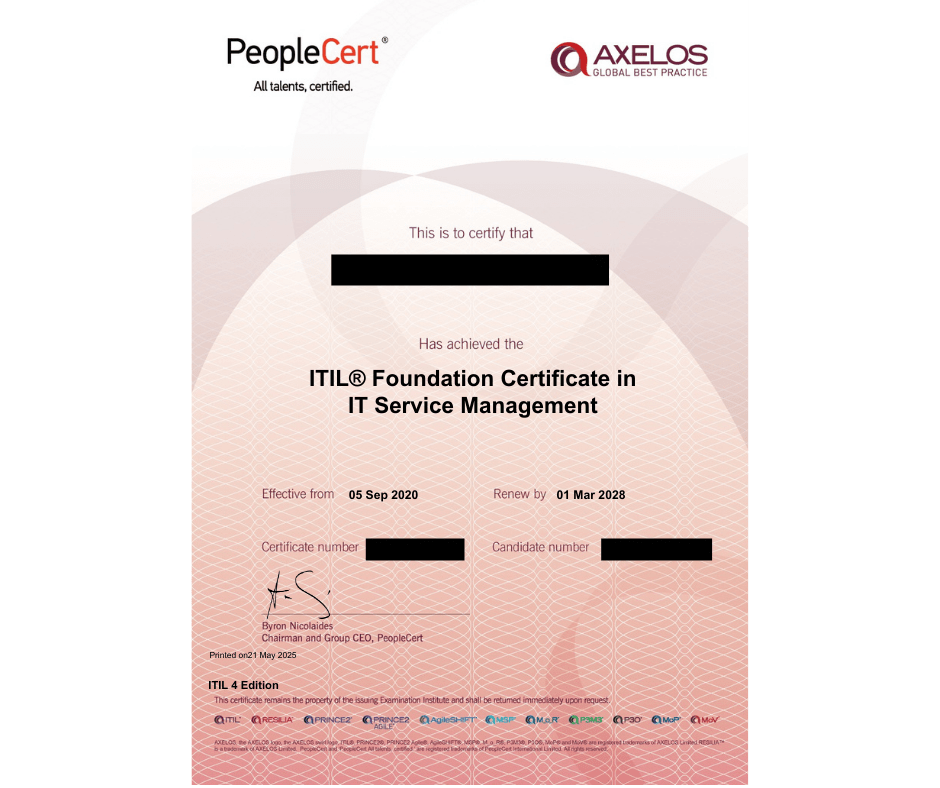- Home
- »
- Cyber Security
Cyber Security Diploma Certification Course
Master practical cyber security skills with real-world projects, expert guidance & globally recognized certifications. Become job-ready in just a few months!
Course Highlights
- Six month Duration
- 4.8 Google reviews
- Senior trainers
- Internship Certificate
- Emerging institute
- Placement ready
- Hiring Partners
- Course Certificate
- Guest Lectures
REGISTER NOW
FOR FREE DEMO
Looking to build a rewarding career in Cyber Security?
Our Alumni Works At




Course Roadmap
Select Your Course
Choose the course and delivery method that suits your learning preferences.
Get Trained & Prepare
Attend the training sessions and use the provided material to solidify your understanding.
Schedule Your Exam
Pick a convenient date and time for your online exam.
Take the Exam
Complete the exam online in a comfortable and secure environment.
Earn Your Accreditation
Pass the exam and receive your certification.
Enjoy Your Certification Benefits
Align IT with your business goals and enjoy a certification.
Program Highlights
Accredited
Trainer
Weekend
Batches
100%
Pass Guarantee
Interview
Ready Program
Course Curriculum
- History and evolution of Amazon Ads
- Importance of Amazon Ads for sellers
- Types of Amazon Ads (Sponsored Products, Sponsored Brands, Sponsored Display)
- Creating and setting up an Amazon Seller Central account
- Navigating the Amazon Ads dashboard
- Billing and payment methods
Module 2: Fundamentals of Amazon Ads
- Lesson 2.1: Understanding Keywords and Targeting
- Types of keywords (broad, phrase, exact match)
- Negative keywords
- Product targeting vs. audience targeting
- Lesson 2.2: Creating Your First Sponsored Products Campaign
- Step-by-step campaign creation
- Choosing products to advertise
- Setting budgets and bids
- Lesson 2.3: Sponsored Brands and Sponsored Display Ads
- Creating Sponsored Brands campaigns
- Setting up Sponsored Display Ads
- Differences and benefits of each ad type
Module 3: Advanced Amazon Advertising Strategies
- Lesson 3.1: Analyzing Ad Performance
- Key metrics: ACOS, ROAS, CTR, CPC, CVR
- Using Amazon’s reporting tools
- Custom reports and data export
- Lesson 3.2: Bid Management and Optimization
- Automated vs. manual bidding
- Bid adjustments based on performance data
- Using placement reports for bid adjustments
- Lesson 3.3: Advanced Targeting Techniques
- Using Amazon’s Audience Insights
- Product targeting strategies
- Competitor targeting
Module 4: Optimizing and Scaling Your Campaigns
- Lesson 4.1: Campaign Optimization
- Optimizing keywords and ad copy
- A/B testing for ad creatives
- Budget allocation strategies
- Lesson 4.2: Scaling Your Ad Campaigns
- Identifying scalable campaigns
- Expanding to international markets
- Using Amazon DSP for programmatic advertising
- Lesson 4.3: Troubleshooting and Best Practices
- Common issues and solutions
- Ad policy compliance
- Best practices for long-term success
Module 5: Case Studies and Real-World Applications
- Lesson 5.1: Case Studies of Successful Campaigns
- Analysis of top-performing campaigns
- Lessons learned and key takeaways
- Lesson 5.2: Practical Workshops
- Hands-on campaign creation and optimization
- Real-time feedback and Q&A sessions
Module 6: Certification and Future Trends
- Lesson 6.1: Amazon Advertising Certification
- Preparing for Amazon Advertising Certification exams
- Practice tests and study guides
Additional Resources
- Bonus Lesson: Tools and Software for Amazon Ads
- Overview of third-party tools like Helium 10.
Final Project
- Capstone Project: Creating and Managing a Comprehensive Amazon Ad Campaign
- Students will create, manage, and optimize a full ad campaign
- Presentation of results and strategies used
Finding Client for Freelancing
- How to find freelance clients on LinkedIn who needs these servers
- Creating and Optimizing Linkedin Page.
- Using Apollo.io tool.
- Using Sales Navigator
- How to build ICP
- How to Build Buyers Persona
- How to build personalized messaging.
- Building funnel marketing
Course Packages
Basic Package
- Online classes: Weekend
- A certified trainer
- Official Training Material
- Exam Voucher
- eBook
- Certificate from PeopleCert
- Interview support services
- Guaranteed Interview opportunities
- 22% Off
$ 35,000 $ 45,000
Advance Package
- Online classes: Weekend
- A certified trainer
- Official Training Material
- Exam Voucher
- Self Paced Videos
- 100% Pass guarantee exam support
- Certificate from PeopleCert
- Interview support services
- Guaranteed Interview opportunities
- Mock Questions
- 16% Off
$ 55,000 $65,000
Corporate Training
- In-House: Weekdays
- A certified trainer
- Official Training Material
- Exam Voucher
- Self Paced Videos
- Mock Exam
- Certificate from PeopleCert
- Course completion Certificate
- 16% Off
$ 55,000 $65,000
ITIL Course Certification
ITIL Foundation Certification – Why It Matters
The ITIL Foundation is a globally recognized entry-level certification in IT Service Management (ITSM).
It helps you align IT services with business goals, boost efficiency, and enhance career opportunities.
Why Choose ITIL?
- Globally accepted certification
- Boosts IT career and salary
- Strong foundation in service management
- Work at top firms like TCS, Infosys, IBM, Wipro and more.
Join GrowthScholars and jumpstart your IT career today!


Want to protect data, stop hackers, and land high-paying tech jobs? Our Cyber Security Mastery Program prepares you with no coding experience needed! Learn ethical hacking, network defense, malware analysis, cloud security, and risk management through hands-on labs and real-world projects.
- Beginner-Friendly Learning – No coding required
- Practical Labs & Real-World Projects
- Learn Ethical Hacking, Risk Management, & Cloud Security
- Globally Recognized Certifications Included
- Job Placement Assistance with Resume Building & Mock Interviews
- Lifetime Access to Learning Materials
Get certified and unlock top roles like Cyber Security Analyst, Ethical Hacker, and Security Consultant in today’s booming tech industry!
Our Success Stories
Growth Scholars exceeded my expectations with their CompTIA A+ course. The material was clear, and the hands-on labs made complex concepts easy to understand. Their trainers were knowledgeable and approachable, ensuring all my doubts were resolved. Highly recommended!
Tools You Will Learn
Python
Power BI
Tableau
Generative Ai
Machine Learning
MySQL
Statistics
Large Language Model
What Skills Will You Learn?
Cyber Security Basics
Gain a solid understanding of fundamental security principles like confidentiality, integrity, and availability. Learn key concepts such as encryption, authentication, and access control.
Ethical Hacking
Discover how ethical hackers identify system vulnerabilities using penetration testing and vulnerability scanning tools. Learn to fix flaws before malicious hackers can exploit them.
Network Security
Dive deep into securing networks with techniques like firewalls, VPNs, and intrusion detection/prevention systems. Understand how to detect, block, and respond to various types of network attacks.
Email Marketing
Gain skills to design and run email campaigns that build customer relationships and boost conversions.
Pay-Per-Click Advertising (PPC)
Learn to create and manage paid ad campaigns on platforms like Google Ads and Facebook Ads to drive immediate traffic and sales.
Web Analytics and Data Analysis
Become proficient in using tools like Google Analytics to track website performance and customer behavior, helping optimize marketing strategies.
Malware Analysis
Master the skills to analyze malicious software, reverse-engineer malware, and develop strategies to block or remove threats. Understand how ransomware, viruses, and spyware operate.
Cloud Security
Learn to secure cloud environments (AWS, Azure, Google Cloud) by applying best practices in identity management, data encryption, and multi-factor authentication. Ensure safe access and privacy for cloud-based services.
Risk Management
Understand how to assess cyber risks, prioritize threats, and implement risk mitigation strategies. Learn about compliance standards like GDPR, HIPAA, and NIST.
Month On Month Journey
Step-by-Step Mastery: From Basics To Internship
Introduction
- What is ITIL®?
- ITIL® 4 Certification Journey
- Course Objectives
- About the Course
Module 1
Key Concepts of Service Management
- Concept of Value
- What Do We Mean by Value?
- Definition of Value
- What is an Organization?
- How is Value Created Between Organizations?
- Service Relationships
- Providers and Consumers Co-Create Value
- Stakeholder and Service Consumer Roles
- Stakeholders
- Service Provider Organizations
- Service Consumer Organizations
- Other Stakeholders
- How is Value Created?
- Service Consumer Roles
- Activity
- Service Offerings
- What is a Product?
- What is a Service?
- What is a Service Offering?
- Creating Value with Services
- Value Co-Creation
- Service Provider
- What are Service Consumers?
- What are Products and Services?
- Definitions
- What are Service Relationships?
- What is the Meaning of Service Provision?
- What is Service Consumption?
- Service Relationship Management
- How Organizations Co-Create Value?
- Service Relationship Model
- Value, Outcomes, Costs, and Risk
- Definitions
- What Can Be Described as Utility and Warranty?
- Review and Reflect
- Quiz
Module 2
Key Concepts of ITIL® 4
- Four Dimensions of Service Management
- Holistic Approach to Service Management
- Four Dimensions of Service Management
- Organizations and People
- What the Dimension Includes?
- What is Culture, and Why is it Needed?
- What a Supportive Culture Requires?
- What to Pay Attention to?
- Organizational Complexities
- Information and Technology
- Things to Consider
- Partners and Suppliers
- Organizations and their Partners and Suppliers
- Forms of Cooperation
- What Goes into Supplier Strategy?
- What is a Value Stream?
- Value Streams and Processes
- Questions to create, deliver and improve
- Activity
- ITIL® Service Value System
- ITIL® SVS
- ITIL® SVS Inputs
- Governance
- Challenges of Silos
- Need for Continual Improvement
- Applying the SVS
- Service Value Chain
- Introduction to the ITIL® Service Value Chain
- Opportunity Vs Demand
- Converting Inputs into Outputs
- Service Value Chain, its Practices, and Value Streams
- Activities
- Review and Reflect Quiz
Module 3
Guiding Principles
- Introduction to the Guiding Principles
- What is a Guiding Principle?
- Focus on Value
- How Value is Perceived?
- CX and UX
- How Would You Apply this Principle?
- Start Where You Are
- Assess Where You Are
- Role of Measurement
- Applying the Principle
- Progress Iteratively with Feedback
- Role of Feedback
- Use of Feedback Loops
- Iteration and Feedback Together
- Collaborate and Promote Visibility
- Communication and Visibility
- Key Collaboration Pairs
- Promote Visibility
- Think and Work Holistically
- Keep it Simple and Practical
- Judging What to Keep
- Conflicting Objectives
- Applying the Principle
- Optimize and Automate
- Road to Optimization
- Using Automation
- Applying the Principle
- Activity: Case Studies
- Using the Guiding Principles
- Guiding Principles in Context
- Guiding Principles Your Examples
- Principle Interaction
- Applying the Guiding Principles
- Guiding Principles: Task
- Principle Interaction
- Review and Reflect Quiz
- Extension Activity 2
Module 4
ITIL® 4 Management Practices
- Purpose of the ITIL® Practices
- Management Practices
- 34 ITIL® Management Practices
- General Management Practices
- Service Management Practices
- Technical Management Practices
- Overview of Eight ITIL® Practices
- Eight Practices
- Information Security Management
- Contribution of Information Security Management to SVC
- Relationship Management
- Supplier Management
- Evaluating and Selecting Suppliers
- Contribution of Supplier Management to SVC
- IT Asset Management
- Contribution of IT Asset Management to SVC
- Service Configuration Management
- Contribution of Service Configuration Management to SVC
- Monitoring and Event Management
- Contribution of Monitoring and Event Management to SVC
- Deployment Management
- Approaches for Deployment
- Contribution of Deployment Management to SVC
- Release Management
- Contribution of Release Management to SVC
- Key Management Practices – Part 1
- What is an Incident?
- Incident Management Guidance
- Incident Management Tools
- Incident Updates
- Types of Incidents
- Collaboration
- Swarming
- Third-Party Products and Services
- Incident Management Contribution to SVC
- Service Request Management
- What is a Service Request?
- Steps for Request Fulfilment
- Request Processes and Procedures
- Service Request Management Contribution to the SVC
- Methods of Fulfilling Requests
- Service Desk
- Automation
- Task: Service Desk ‘Pitch’
- Service Desk Provisions
- Service Desk Support
- Service Desk Skills
- Service Desk Contribution to the SVC
- Key Management Practices – Part 2
- Problem Management
- Phases of Problem Management
- Identifying a Problem
- Problem Control
- Workaround
- Error Control
- Links to Other Practices
- Interfaces
- Problem Management Contribution to the SVC
- Continual Improvement
- Applying Continual Improvement
- Continual Improvement Model
- What is the Vision?
- Where are We Now?
- Where do We Want to Be?
- CSFs and KPIs
- How do We get There?
- Take Action
- Did we Get There?
- How do We Keep the Momentum?
- Methods to Continually Improve
- Continual Improvement Activity
- Tracking
- CI Responsibility
- Continual Improvement Contribution to the SVC
- Key Management Practices – Part 3
- Service Level Management
- Activity
- Service Level Agreements
- Key requirements for SLAs
- Watermelon SLA Effect
- Customer Engagement
- Customer Feedback
- Metrics
- Service Level Management Contribution to the SVC
- Change Enablement
- Define Change
- Scope of Change Enablement
- Change Authority
- Types of Change
- Scheduling
- Change Enablement Contribution to the SVC
- Review and Reflect
- Quiz
- Activities
- Course Review
- What’s Next?
Module 5
We've got answers
Frequently asked questions
Quick answers to questions you may have. Make an informed decision before embarking on your learning journey.
- Cyber Security Analyst
- Ethical Hacker
- Network Security Engineer
- Security Consultant These are among the highest-paying Cyber Security jobs in India and globally.
Ready to Start Your Journey?
Don't miss out on the opportunity to transform your career. Join Growthscholars and gain the skills you need to succeed in the tech industry.


